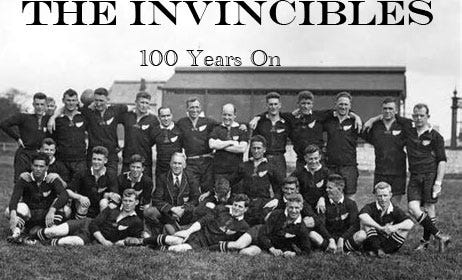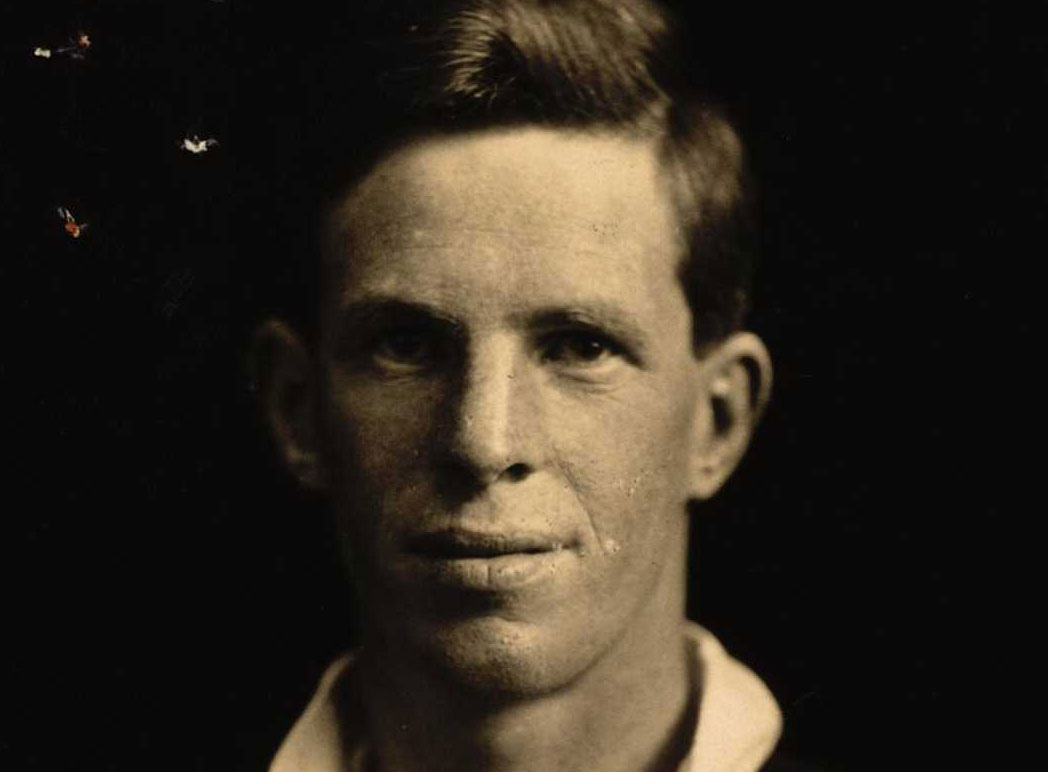Maark Nicholls has a curious place in New Zealand rugby history. Invariably, when discussions are held about outstanding first five-eighths in the Kiwi game, Nicholls' name is mentioned. Yet, in his Test career, his most influential performances were not in that position.
As early as 1921, against the Springboks, he was moved from his first five-eighths position in the first two Tests to centre for the third. On the Invincibles tour, when towards the end of the tour in the challenging programme the side faced, he most often played at second five-eighths, outside Neil McGregor and inside Bert Cooke. Nicholls took a hammering through the tour's early stages and was injured several times. That saw McGregor, also a fine defender, emerge. With ongoing issues at centre, it was decided to move Nicholls and Cooke out a position to give the backline more all-round strength.
Mark Nicholls (Archives New Zealand Reference: ACGO 8333 IA1 1349 15/11/17721)
On tour, Nicholls played seven games at first five-eighths, and nine at second five-eighths. He and Cooke were partners in 13 of the games. Across his All Blacks career, he played 51 games, 23 at first five-eighths (with one appearance as a reserve), 26 at second five-eighths and once at centre.
Born in Greytown on July 13, 1901, he was the third of three brothers to play for New Zealand. A Wellington school representative from Petone West School at rugby and cricket in 1913 and 1914, he attended Wellington College, where he played in the first XV from 1917-1919, captaining the side for the last two years. He also won the Wellington Secondary Schools tennis championship in 1916 and captained Wellington College's first cricket XI in 1917. He continued to play cricket for Petone seniors during the 1920s.
In 1920, he won a permanent place in the Wellington provincial side. He played in nine of Wellington's 11 Ranfurly Shield challenges, missing the 15-3 win over Canterbury and the 22-3 win over Bay of Plenty. He secured his place in the side after Teddy Roberts and Jimmy Tilyard toured Australia with the All Blacks in 1920, retaining his place when they returned.
In 1921, while not selected for the inter-island game, he played on the losing side 22-30 in the All Blacks trial. A week before the final Test, he helped Wellington regain the Ranfurly Shield they had lost in Invercargill a year earlier, from Southland, kicking two conversions and two penalty goals in their 28-13 win in Wellington. Four days after the final Test, Wellington defended the Shield against Auckland, winning 27-19, Nicholls scoring in all ways with a try, conversion, one penalty goal and a dropped goal.
He had his first game for the North Island in 1922 in an 8-9 loss to the South Island. He was included, along with halfback brother 'Ginger', in the All Blacks to Australia, who lost the Test series 1-2. Winston McCarthy claimed Nicholls had a run-in on the tour with an official, which contributed to his not being selected in 1923.
Even when playing well in the 1924 trials for the All Blacks tour, it was a surprise to many that he was included in the side. That was down to the lack of quality five-eighths. While not featuring in a North Island trial game, he was paired with Bert Cooke for the following inter-island game, won by the North 39-8 and from that, he was selected as one of the 16 certainties, although several critics believed he was fortunate. On the preliminary tour to Australia, he displaced Ces Badeley at first five-eighths after the first Test.
On the British, Irish, and French tour, Arthur Carman said he was 'the most useful and sound man in the backs'. However, due to his defensive load, he did suffer injuries. At one stage, he was out for five games after an injury against Leicester and another five after the Wales Test. He was a doubtful starter against England. Yet, he proved himself a competitor in the most demanding of circumstances.
Carman said his effort in the close run game against Newport was remarkable.
In the second spell, when with the New Zealand backs showing signs of crumbling up entirely, Mark was fielding faultlessly, kicking soundly, and he it was, who rallied the team, and had most to do with the final win over 13-10. Matters looked serious for a while, but the sight of Mark Nicholls, imperturbably playing the game of his life, rallied the team.[1]
In its tour review, Wisden's Rugby Almanck said he was the 'brains of the team'.
Among the great players of the 1924 New Zealand team, none ranked higher than M.F. Nicholls, the unofficial 'captain of the backs'. A remarkably clear-headed leader of men, and an exceptionally sound and well-equipped player, Nicholls, in his conduct of operations in the five-eighths position, showed a conception of the New Zealand game that amounted to genius. Not for him was the actual scoring of tries, but the originating and development of attacks that so frequently penetrated the opposing defence.
A straight, clever runner, he passed with rare judgment and accuracy and stood out as the best drop-kick and place-kick in the team. Under his influence, Cooke rose to great heights, and whenever he took his place in the field, the whole side seemed inspired by his ingenuity and execution. During the tour in this country, Nicholls must actually have been responsible for the majority of the tries, but so unobtrusive a player was he that to any but a close student of the game, he appeared to be doing nothing out of the common.
One, if not the greatest of his assets as a footballer, was his almost uncanny gift of seeing at a moment the weak spot – temporary or otherwise – in the opposing side's dispositions. On that, he either directed the attack immediately or else feigned movements in another direction only to deliver, when the proper time came, a devastating blow at the original breach. Because probably of the fact that he actually scored only one try and his quiet style of play, he did not catch the public eye to anything like the extent that Nepia or Cooke did, but he ranks with the really great men of the rugby game.[2]
Sellicks regarded Nicholls as the soundest player in the team.
There is nothing flashy about him, but he is always at work, and nothing comes amiss to him. His accurate kicking has been of immense value, and he has scored nearly a hundred points himself, but his solid hard work has been more valuable still. More than once, when his team has been in trouble, as at Newport, he has kept his head and has pulled them through. A great, wonderfully effective player, few of the party can look back on the tour with as much satisfaction as Mark Nicholls.[3]
Yet those comments, his confidence in his abilities and his use of foul language, were to come back and haunt Nicholls.
Four of the player-members of the [1928] Selection Committee – Brownlie, Stewart, McGregor, and Nicholls – toured Great Britain with the 1924 All Blacks. Nicholls on that occasion was described as 'the brains of the All Blacks.' Some of the players did not like it. It was still remembered in 1928.[4]
In New Zealand, he toured Australia in 1926 and was vice-captain to Maurice Brownlie for the 1928 tour to South Africa. He played only once at first five-eighths in his 12 games as Neil McGregor and Lance Johnson, both of whom started their careers in Southland, were the preferred selections. Many rumours surrounded an alleged split in the side due to bizarre selection decisions made during the tour. Nicholls and Maurice Brownlie were believed not to get on, yet both stated that at the end of the tour, there were no disputes in the side.
New Zealand Press Association writer Graham Beamish covered the tour and took a different view. He was in no doubt all was not happy. Initially, the trouble started with the forward pack refusing to meet the Springbok scrum threat by binding tight and pushing. Instead, they looked to play New Zealand's favoured loose game. Eventually, they adopted a loosehead in Ron Stewart to at least gain scrum parity with the Springboks.
The South Africans couldn't believe their luck when the New Zealand selectors [manager W.F. Hornig, Maurice Brownlie, Nicholls, Stewart and McGregor] failed to choose Nicholls or centre Fred Lucas in their first three Test sides. Beamish said the South African selectors were puzzled but delighted when the All Black's first Test team was named.
One of the South African selectors said to me that day: 'Until this minute the All Blacks had a chance of beating South Africa. Without Mark Nicholls they have no chance. I cannot understand it.'[5]
Beamish believed the absence of Nicholls and Lucas caused cliques to form among the tourists.
A feeling of resentment crept in. The All Blacks knew they were being quietly laughed at by the Springboks. The exclusion of Nicholls and Lucas from the Test teams of 1928 was the greatest tragi-comedy New Zealand Rugby history has ever known.[6]
Yet several players, including halfback Bill Dalley and wing Alan Robilliard, claimed Nicholls' absences were the result of poor form.
Nicholls was simply not playing well enough and that's all there is to it. I don't believe things would have gone any differently if he had played in the other Tests. The best players at the time were picked and they were fine players, every one of them.[7]
Robilliard said Nicholls lacked form.
He was like we were in 1924, when some of us weren't getting games. He was getting a bit long in the tooth by then, too. He was very strong in his ideas.[8]
Another of the All Blacks' tourists, Jim Burrows, said,
The selectors met in private and their deliberations remained confidential, but there was never any rumblings about the Test sides. They were all accepted as fair selections.[9]
When he was finally given a chance in the fourth Test, Beamish remembered seeing Nicholls at training.
Nicholls, realising that sound scrummaging was essential to All Black success, endeavoured to drum into the forwards the necessity for packing a tight scrum. He urged them not to break fast, as they had been doing. One of his co-selectors told him that his job was to look after, and train the backs', the fowards could look after themselves.[10]
Nicholls had the last laugh, contributing 10 of the All Blacks' 13 points in their 13-10 win to draw the series and be proclaimed the hero of the hour.
Back in New Zealand, he battled injuries, and after playing in the second and third Tests against the 1930 British & Irish team, his international career ended, while his first-class career ended with Wellington in 1931.
He continued as a selector for Wellington from 1934-38, was a New Zealand selector in 1936-37 and a North Island selector in 1948. In the late 1930s, Nicholls was a regular columnist for the Weekly News. Nicholls died in the Bay of Plenty in 1972.
[1] Arthur Carman, Daily Telegraph (Napier), October 1927
[2] Wisden Rugby Almanack, John Wisden and Co., London 1925
[3] FJ Sellicks, The Cricketer, 1925
[4] Graham E. Beamish, Evening Star Sports Special, undated
[5] Beamish, ibid
[6] ibid
[7] Bill Dalley, The Press, 23 August 1978
[8] Alan Robilliard, The Press, 15 April 1983
[9] Jim Burrrows, The Press, 23 August 1978
[10] Beamish, ibid




